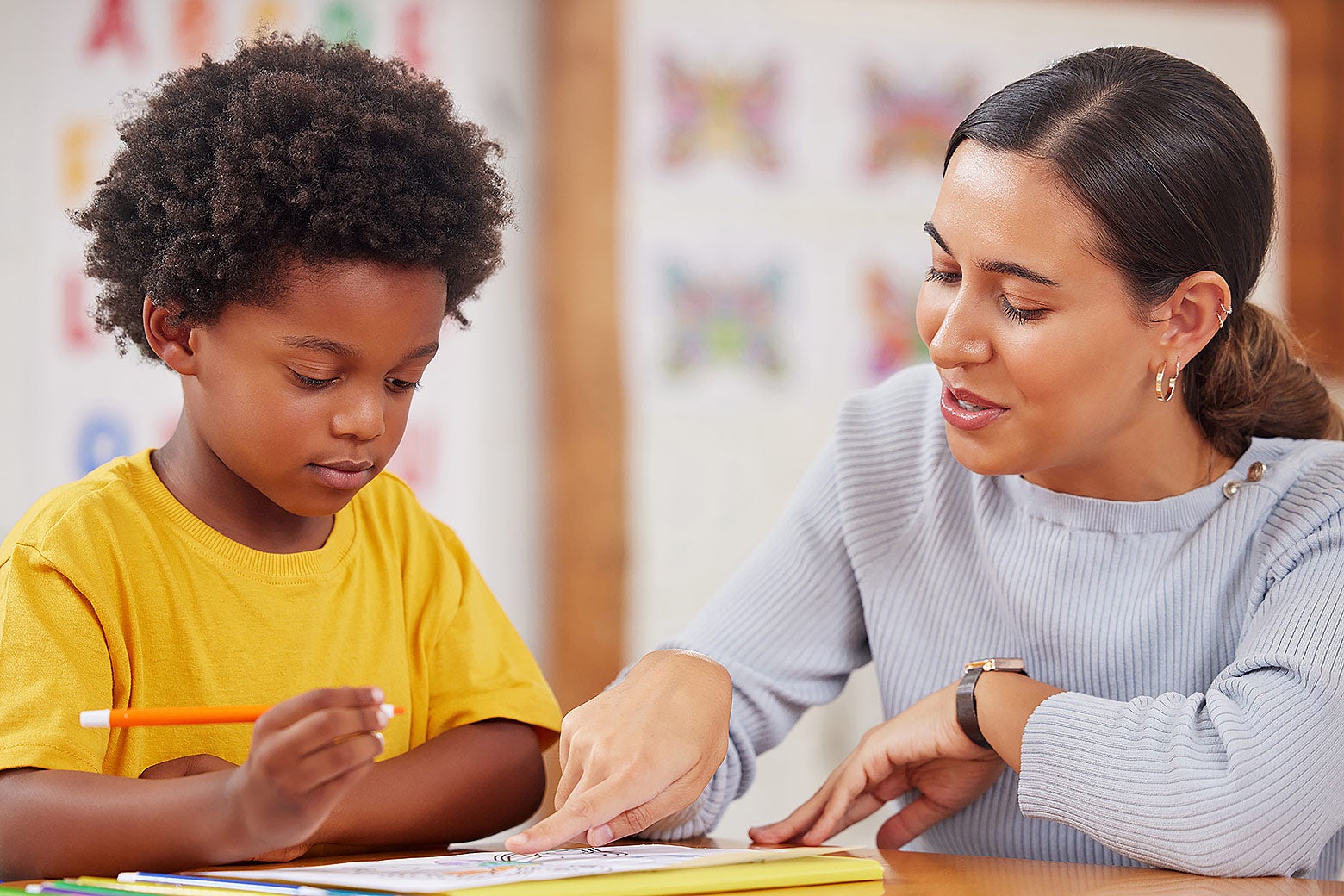School
Why elementary school teachers should consider doing report cards a little bit differently.

PeopleImages/iStock/Getty Images Plus
It’s time to change the way we write report cards to young students, as early as kindergarten. Instead of writing about them, we educators should write to them.
Businesses have learned that performance reviews are most effective when written in the second person rather than the third person—to you rather than about you. This is a seemingly small linguistic shift. Ozlum Ayduk and Ethan Kross, professors of psychology, found that in the context of self-talk, it’s powerful to use someone’s name. But this understanding has not yet trickled down to report cards, our earliest forms of assessment and feedback.
Let’s imagine a second grader who just completed their first term at a new school. The teacher writes in the report card, “Bonnie is distracted and drawn to talking with friends frequently during math class.” Another section reads, “Bonnie calls out frequently during read-alouds, and while I appreciate her ideas, raising a quiet hand is the expectation in class.”
Perhaps these excerpts remind you of your own childhood report cards? They reminded me of my own. This language, which I modeled after countless elementary report card narratives, is ineffective and unconstructive.
Here is what second-grade Bonnie’s feedback could sound like: “Bonnie, I notice that you are eager to talk with friends during math class, and I am worried that you miss a lot of our lessons. I am wondering how we can assure you focus. We tried a new seating arrangement, but I’d like you to work with me on additional solutions.”
In this example, the teacher has respectfully addressed the student directly. The teacher empathizes and acknowledges efforts already made, and includes the student in finding solutions. While certainly not foolproof, this strategy, which honors the child’s perspective and role in their own learning, is sure to land differently with both student and guardian.
Researchers in the field argue that feedback to students from teachers is crucial to motivation and learning. But that feedback, when written exclusively in the third person, soars past students to guardians.
As a former elementary school teacher, I turned to my community for their perspective on the matter. Most shared that they had never heard of reports being written to students, rather than about them. Those who have seen a second-person model of feedback teach secondary grades (sixth grade and higher), and two of those teachers said they ask students to self-assess and collaborate on their scores.
All but one of the elementary (K–5) teachers I surveyed said their reports were written in the third person.
A teacher-authored article titled “Why I Don’t Let My Kids Read Their Report Cards” from the website Today’s Parent shares the opposing point of view: “I spend a lot of time writing report cards to give families a clear picture of how their child is progressing. But those comments are written for parents. Younger kids won’t fully understand what the comments mean and will often stop at the letter grades—which means they miss out on the important context of how that grade was achieved.”
While it’s true that for many teachers, the report card comments are written for guardians—that’s what schools mandate—it baffles me that we don’t interrogate this process. If it’s context that’s lacking, let’s give students the context. Let’s construct our feedback for them, in addition to their guardians. With sufficient professional development and feedback on language, this shift could improve student motivation and concepts of self-growth.
Asked about the idea of second-person report card narratives, Dr. Rebecca Silverman, an associate professor at Stanford’s Graduate School of Education and a mother of three, said, “Even young children appreciate when teachers acknowledge their growth, especially when they put in a lot of effort to learn something new or be able to do something that was initially hard for them.”
It’s true that families still need to hear from teachers about their children’s progress via report cards. But their young age shouldn’t exclude children from hearing directly from their teachers as well. Dr. Meryl Lipton, a behavioral pediatric neurologist, commented, “Students as young as kindergartners would benefit from refocusing the audience of report cards. This creates important opportunities for self-growth and furthers communication between student and teacher.” If report cards are our earliest performance reviews, then let’s shift our perspective to include students in their own feedback.
Education
Kids
Research
>>> Read full article>>>
Copyright for syndicated content belongs to the linked Source : Slate News – https://slate.com/human-interest/2024/02/report-cards-teacher-feedback-writing.html?via=rss










